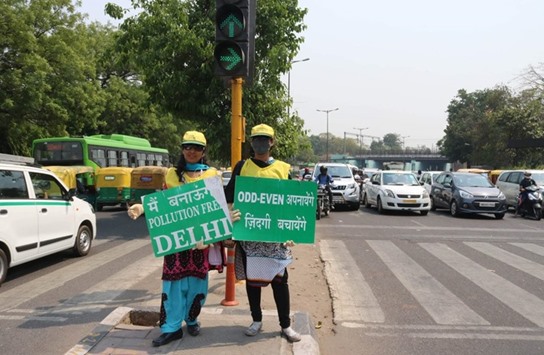Delhi Transport Minister Gopal Rai yesterday said the second phase of the ‘odd-even’ car curbs was a success and a decision on the next round will be taken after a study of both phases by an experts’ committee.
“Now, we have the experience of conducting odd-even traffic scheme during two seasons, winter and summer, with schools and colleges open during one phase. So the government will study both the models and only then a decision will be taken for the third phase,” Rai told reporters.
“A six-member committee has been formed by the government to study the report of both phases of the car rationing scheme,” Rai said, adding: “The committee will be headed by special commissioner of transport K K Dahiya and it will submit its report on May 9.”
He also said after May 9 the government would again seek public opinion for the third phase.
The minister thanked all members of parliament for supporting the Delhi government’s scheme of car rationing.
The second phase of the odd-even scheme was implemented in the national capital on April 15 to 30 and the first phase from January 1 to 15.
Earlier in the day, Rai showed his concern over people not using the public bus transport. “Even though there has been high usage of the metro in the second phase, the public bus transport has not been used to its full potential.”
He also said of the 2.5mn cars in Delhi, only 8,000 were fined as the scheme was followed by 99.9% people during the second phase.
Highlighting the reason for the success of the scheme, Rai said: “A common effort through public and government co-operation always promotes the successful implementation of any scheme.”
Rai appreciated Delhis’ youth, saying: “There is a change in the mindset of youth whose love for cars and bikes is now being replaced by the consciousness to follow the odd-even programme for a better quality of life.”
Expressing concern over app-based taxi companies, Rai said: “Our government is working on a policy for the taxi-aggregators, which we will announce soon.”
Emphasising on the need for premium bus service, Rai said: “During the second phase of the odd-even scheme, we noticed many of the car users didn’t use public transport system more. So, for them, a premium bus service would be started from June 1 as a pilot project.”
Meanwhile, the Supreme Court was told yesterday that a ban on diesel vehicles with engine capacity of 2000 cc or more was arbitrary as there was no “established” link between engine capacity and emission levels.
Senior lawyer Abhishek Manu Singhvi appearing for Society of Indian Automobile Manufacturers (SIAM), told the court that diesel vehicles with engine capacities of 2000 cc or more were being wrongly targeted for the deteriorating air quality in the national capital, and said the real culprits were older pre-BS I, BS I and BS II diesel vehicles emitting more pollution.
“To reduce emission from diesel vehicles, the most effective way is to ban/phase out/penalise the older BS I, BS I and BS II vehicles that emit several times of what a BS IV vehicle emits,” he said.
In another development, the Supreme Court refused to give more time to taxi operators in the National Capital Region (NCR) to switch from diesel to the cleaner compressed natural gas (CNG).
The deadline for the change, which has been extended twice, was yesterday.
A number of cab operators and their associations urged the court for an extension of the deadline, but a bench of Chief Justice T S Thakur, Justice A K Sikri and Justice R Banumati refused the request.
The court, by its December 16, 2015 order, had initially asked the diesel cab operators in Delhi to switch over to CNG by March 1. However, by its January 5, 2016 order, the court, bringing all the diesel taxis operating in the NCR in the ambit of its December 16 order, extended the deadline to March 31.

Civil defence volunteers stand on a Delhi street with placards during the final day of the second phase of the odd-even traffic scheme yesterday.
